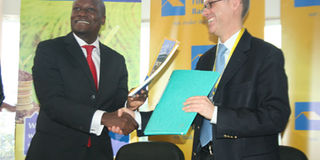European Investment Bank, Housing Finance sign Shs45b credit facility

Housing Finance Bank managing director Mathias Katamba (L) exchanges signed Memoranda with Mr Loic Le Ruyet, the European Investment Bank deputy head of division East and Central Africa, in Kampala yesterday. PHOTO BY STEPHEN OTAGE
What you need to know:
Factor. Price cuts blamed on local factories’ failure to export surplus
Kampala.
The European Investment Bank has signed a Shs45 billion credit facility with Housing Finance Bank, targeting local entrepreneurs in agriculture, tourism, education and manufacturing.
While signing the facility yesterday, Mr Loic Le Ruyet the European Investment Bank deputy head of division East and Central Africa, said Housing Finance Bank becomes the seventh in Uganda to benefit from the credit facility being extended to Small and Medium Enterprises (SMEs) in developing countries around the world at an affordable rate.
“We know that SMEs need long term financing especially if they are involved in manufacturing because during their first three years of existence, they have challenges with revenue growth, interest rates volatility but we manage this by setting fixed interest rates with the partnering banks,” he said.
Mr Mathias Katamba, the Housing Finance Bank managing director, said the challenge that the bank has been facing has been of sustaining long term loans because most of its customers are short term borrowers who depend on short term plans. “With this facility now, it means we have large financing depending on the sectors and we are happy that sectors like agriculture, manufacturing and tourism require long term investments and research,” he said.
According to Mr Loic, last year alone, the European Investment Bank Group provided €22 billion (about Shs75 trillion) for SME lending around the world. Uganda Investment Authority defines an SME in Uganda as a business employing a minimum of 50 people with an annual turnover of Shs300 million.
Mr Peter Ngobi, an out grower in Jinja District, however, disagrees with Mr Kabeho accusing the factories of connivance to keep the prices low in order to profit more from the farmers.
“The Price of sugar has not declined this is a deliberate move to keep farmers poorer,” Mr Ngobi said.
“The number of dfcu shares available on the USE has doubled from 250 million shares at the time of listing in 2004 to the current number of 500 million shares,” he said.
On the future plans and outlook, the bank’s chief of business, Mr Paul Van Apeldoorn, said the bank is focusing on growing its business base through retail banking and expanding its current branch network from 45 to 50 branches in the near future.
“Besides expansion, our area of growth/operations is going to be in oil, gas, minerals and agriculture where we are seeing a lot of opportunities alongside SMEs and institutional banking,” he said.
financial support
In April 2011, the European Investment Bank pledged to assist numerous African businesses. In Uganda, Centenary Rural Development Bank, Crane Bank, DFCU Bank and Housing Finance Bank would receive long-term funds in Ugandan Shillings, US dollars and Euros from the European Investment Bank under the Private Enterprise Finance Facility II Bank of Africa (Uganda), to assist their lending operations to local businesses seeking to expand or invest in new activities.




